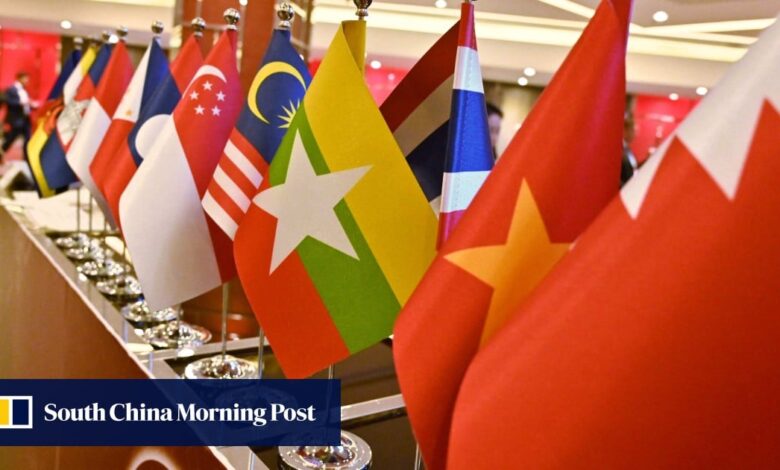China must step up economic fight with US in key Asean battlefield, prominent political economist Zheng Yongnian says

[ad_1]

China must cement closer ties with its Southeast Asian neighbours, with the market of over 600 million inhabitants having turned into a key battlefield to build regional influence and economic supremacy over the United States, according to a prominent political economist.
Zheng Yongnian, who has been advising Beijing’s policymakers after two decades of research on China’s rise on the global stage, said the world’s second-largest economy needs to unilaterally open up more to the 10-member Association of Southeast Asian Nations (Asean) to bring them within China’s economic gravity amid the escalating US rivalry.
Asean has actually become a main area between China and the US to fight for
“Asean has actually become a main area between China and the US to fight for,” said Zheng, who is the president of the Institute for International Affairs, Qianhai, a think tank based in Shenzhen, in a transcript of a speech he made in Kunming, Yunnan province, on August 18 that was released on Tuesday.
The world’s two largest economies have been involved in a tit-for-tat tariff war since 2018, and tensions have spilled over into technology, with Washington restricting the access of hundreds of Chinese companies to American technology, parts and its market.
Meanwhile, the 10-member Asean bloc – which is made up of Brunei, Cambodia, Indonesia, Laos, Malaysia, Myanmar, the Philippines, Singapore, Thailand and Vietnam – has surpassed the US and European Union to become China’s top trading partner.
Game changer or white elephant? China eyes Asean links with shipping canal
Game changer or white elephant? China eyes Asean links with shipping canal
Zheng called on Beijing to start by opening its borders to Laos and making better use of the railway link between the two countries, then use it as a model to lure more Southeast Asian countries through economic benefits.
Washington, the largest investor in the Asean region, is also fostering closer alliances with the Philippines, Thailand and Vietnam, all of which are members of its Indo-Pacific Economic Framework for Prosperity, along with Brunei, Indonesia, Malaysia and Singapore.
China eyes Asean trade ties, but members fear falling into ‘geopolitical trap’
China eyes Asean trade ties, but members fear falling into ‘geopolitical trap’
The Asean has been developing relations with the two superpowers, while it chose to stay neutral when the Russian invasion of Ukraine in February 2022 created a division between China and the West.
However, “if there is a real conflict between the US and China, most of them would turn back to the US as they are part of the US security system,” said Zheng, who is also chairman of the academic committee of the Institute for Public Policy at the South China University of Technology.
Asean is the top priority of China’s neighbourhood diplomacy and the focus of the US Indo-Pacific strategy
Xu Bu, China’s former Asean ambassador, said at a seminar last year that China needs to strengthen economic and trade cooperation with the bloc to counter the political impact of the US.
“Asean is the top priority of China’s neighbourhood diplomacy and the focus of the US Indo-Pacific strategy,” said Xu, a researcher at the China Institute of International Studies, a think tank backed by China’s Ministry of Foreign Affairs.
China and the Southeast Asian bloc are negotiating an updated version of their Asean–China Free Trade Area, further extending trade cooperation into digital and green emerging areas.
More economic engagement on equal terms, be it with Beijing or Washington, is generally welcome in Southeast Asia
Chong Jia Ian, an associate professor of political science at the National University of Singapore, said China’s approach may face challenges because of US restrictions.
“I am unsure what its effect for responding to US trade restrictions, especially on technology, might be. That said, more trade liberalisation can be a good thing and is not a zero-sum game,” he said.
“More economic engagement on equal terms, be it with Beijing or Washington, is generally welcome in Southeast Asia.”
[ad_2]
Source link




